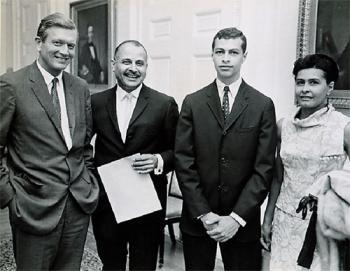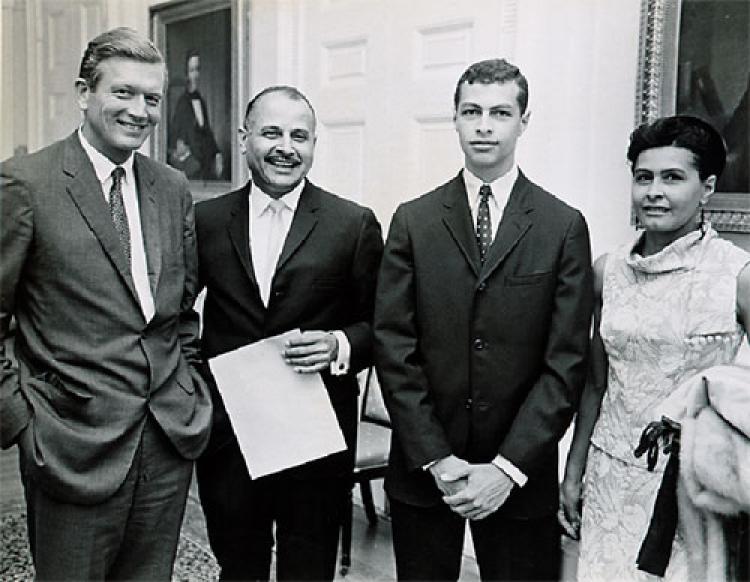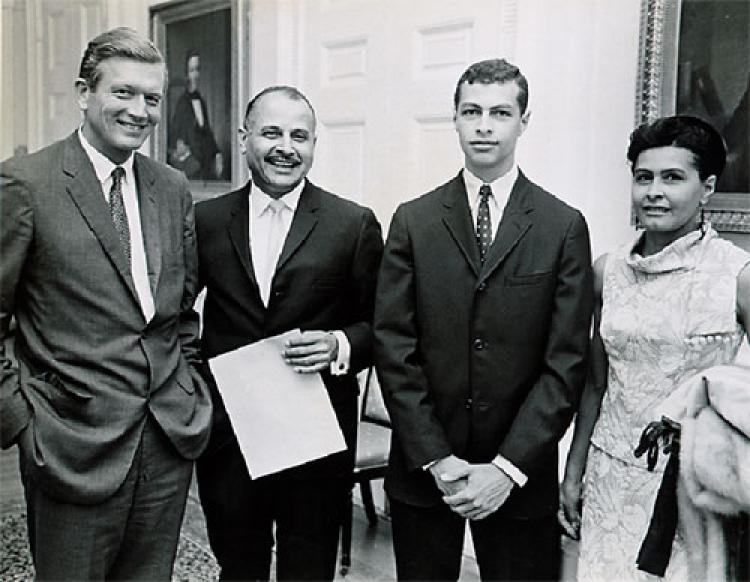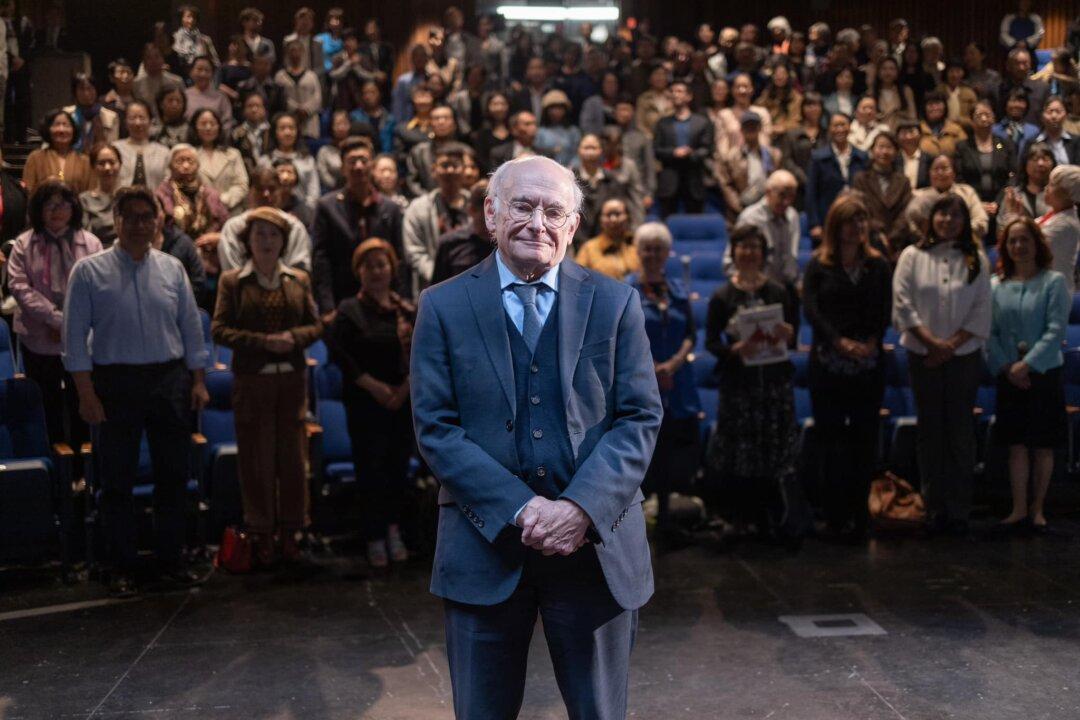African American leader and politician Percy Sutton passed away this weekend at the age of 89.
New York Governor David Paterson and President Barack Obama each issued a statement, expressing their admiration for the man, who was, among many things, a World War II (WWII) hero, a civil rights attorney, a New York politician, and a highly successful businessman.
The family has yet to comment on his death, the cause of which is yet unknown.
Sutton was not only praised for his personal accomplishments, but also for his role in helping and mentoring others, especially the African American community in New York.
“Percy Sutton was a true hero to African Americans in New York City and around the country,” said President Obama. “His life-long dedication to the fight for civil rights and his career as an entrepreneur and public servant made the rise of countless young African Americans possible.”
One such person was Rev. Al Sharpton, a prominent civil rights activist and radio host, who honored Sutton at a press conference in Harlem on Sunday.
“To me, he was someone who was a voice for us when people wouldn’t listen,” said Sharpton.
Sutton supported Sharpton throughout his career, from sponsoring his attendance at a national black convention as a youth to supporting him in his campaign for the 2004 presidential election.
Sharpton expressed his admiration for Sutton by saying, “He was the biggest guy in the community, but he was the one that you saw at the smallest rally.”
Quase Beasley, a 28-year old teacher, was passing by and stopped to listen to Sharpton’s tribute to Sutton.
“He was not the typical politician—he was about the human side of politics. He focused on the person,” said Beasley, who learned about Sutton in her studies of black history.
The son of a former slave, Sutton fought in WWII as part of the famed Tuskegee Airmen, the all-black aviation combat unit. In the early 1950s, he established his law practice in Harlem, where he became well known for his defense of civil rights activists. Sutton’s most prominent client was Malcolm X—at a time when no one wanted to represent him.
In 1966, Sutton became the highest-ranking black politician in the state, when he was elected as the Manhattan borough president. His 10-year tenure made him the longest serving Manhattan borough president. He also served a term in the New York state assembly.
Sutton also broke several records in business. According to an Associated Press report, in 1971, his purchase of the WLIB-AM radio station made it the first black-owned station in New York City. Soon after, his Inner City Broadcasting Corporation bought WBLS-FM, which became one of the most popular radio stations in the city. The Inner City Broadcasting Corporation eventually came to own over 18 radio stations in several U.S. cities.
Sutton’s support of organizations working towards economic development in Harlem also led to his popularity in the area. Rev. Sharpton spoke on Sunday in front of Harlem’s famed Apollo Theater, known for launching the careers of some of the greatest African American performers, including Ella Fitzgerald, Patti Labelle, Aretha Franklin, and the Jackson 5. It was Sutton who saved Harlem’s iconic Apollo theater from bankruptcy in 1981 and opened it several years later, after investing millions of dollars.
Sharpton recalled sitting with George Brown in a limousine and thanking him for “re-opening the temple of black culture.”
The theater, now celebrating its 75th anniversary, did its own tribute by screening: “In memory of the honorable Percy Sutton. We are forever grateful. Always, your Apollo friends.”
New York Governor David Paterson and President Barack Obama each issued a statement, expressing their admiration for the man, who was, among many things, a World War II (WWII) hero, a civil rights attorney, a New York politician, and a highly successful businessman.
The family has yet to comment on his death, the cause of which is yet unknown.
Sutton was not only praised for his personal accomplishments, but also for his role in helping and mentoring others, especially the African American community in New York.
“Percy Sutton was a true hero to African Americans in New York City and around the country,” said President Obama. “His life-long dedication to the fight for civil rights and his career as an entrepreneur and public servant made the rise of countless young African Americans possible.”
One such person was Rev. Al Sharpton, a prominent civil rights activist and radio host, who honored Sutton at a press conference in Harlem on Sunday.
“To me, he was someone who was a voice for us when people wouldn’t listen,” said Sharpton.
Sutton supported Sharpton throughout his career, from sponsoring his attendance at a national black convention as a youth to supporting him in his campaign for the 2004 presidential election.
Sharpton expressed his admiration for Sutton by saying, “He was the biggest guy in the community, but he was the one that you saw at the smallest rally.”
Quase Beasley, a 28-year old teacher, was passing by and stopped to listen to Sharpton’s tribute to Sutton.
“He was not the typical politician—he was about the human side of politics. He focused on the person,” said Beasley, who learned about Sutton in her studies of black history.
The son of a former slave, Sutton fought in WWII as part of the famed Tuskegee Airmen, the all-black aviation combat unit. In the early 1950s, he established his law practice in Harlem, where he became well known for his defense of civil rights activists. Sutton’s most prominent client was Malcolm X—at a time when no one wanted to represent him.
In 1966, Sutton became the highest-ranking black politician in the state, when he was elected as the Manhattan borough president. His 10-year tenure made him the longest serving Manhattan borough president. He also served a term in the New York state assembly.
Sutton also broke several records in business. According to an Associated Press report, in 1971, his purchase of the WLIB-AM radio station made it the first black-owned station in New York City. Soon after, his Inner City Broadcasting Corporation bought WBLS-FM, which became one of the most popular radio stations in the city. The Inner City Broadcasting Corporation eventually came to own over 18 radio stations in several U.S. cities.
Sutton’s support of organizations working towards economic development in Harlem also led to his popularity in the area. Rev. Sharpton spoke on Sunday in front of Harlem’s famed Apollo Theater, known for launching the careers of some of the greatest African American performers, including Ella Fitzgerald, Patti Labelle, Aretha Franklin, and the Jackson 5. It was Sutton who saved Harlem’s iconic Apollo theater from bankruptcy in 1981 and opened it several years later, after investing millions of dollars.
Sharpton recalled sitting with George Brown in a limousine and thanking him for “re-opening the temple of black culture.”
The theater, now celebrating its 75th anniversary, did its own tribute by screening: “In memory of the honorable Percy Sutton. We are forever grateful. Always, your Apollo friends.”






